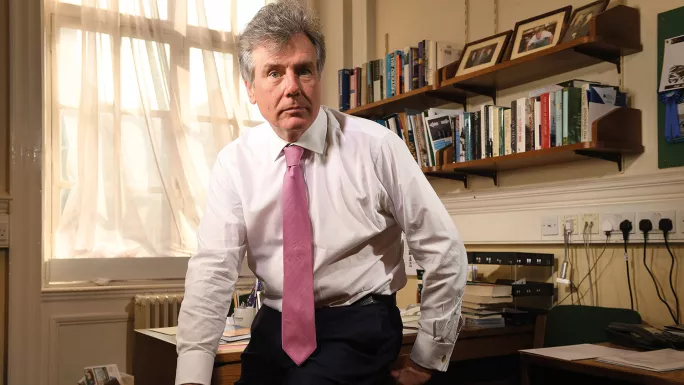The Tory who’s ploughing his own furrow on education

For a Conservative backbencher battling his all-powerful prime minister over her two highest political priorities, Neil Carmichael appears a remarkably relaxed man.
The chair of the Commons Education Select Committee reclines in a green House of Commons armchair in his office, hands linked comfortably behind his head, with a signed poster of his political hero, Ted Heath, hanging on the wall behind him.
Not for him the confrontational language of others who share his opposition to the creation of more grammar schools or a hard Brexit, but instead the measured, agreeable tone familiar from his committee hearings.
But don’t mistake that for a lack of steel. For many, Carmichael is emerging as the most effective opposition to government on education issues, whether it be grammar schools, the appointment of a new head of Ofsted or teacher recruitment.
It’s all a long way from the Northumberland countryside, where he was brought up.
His father, a hill farmer, was in the middle of lambing season when baby Neil was born in April 1961, “but was pleased with the news when he heard about my arrival”.
Carmichael’s first experience of education was at Elsdon Primary School, a two-class state school run by a husband and wife, who lived in the attached house.
“I think it gave me a strong sense of community because we all lived in Elsdon or around it, so we didn’t travel far in those days,” he says.
Then, after his mother fell ill, he began a decade at boarding school. First, Corchester Preparatory School - “if you imagined a bad school and then tripled it up, you would get somewhere near to what that school was like” - and then, from the age of 13, a much happier experience at St Peter’s School in York.

A lower-sixth trip to Morocco stands out. He recalls, with a wry smile, his group of 11 students and two teachers plying a platoon of soldiers with whisky in a contested part of the Sahara.
At the University of Nottingham, he ran against a future Tory education minister, John Hayes, to chair the student Conservative association. They were from opposing wings of the party, and Hayes won - “but not with a big majority” - and the two remain friends today.
His return to run the family farm after graduation gave him an abiding concern about the lack of skills in the workforce.
“I think very early on I got quite interested in the need to deal with education,” Carmichael says. “I always wanted to know why it was we were not surging ahead as a country.”
It is a question that impelled him to launch a select committee inquiry into the “purpose and quality of education in England” in 2015.
Committee members have embarked on trips to learn from the education systems in Finland and South Korea, and Carmichael has focused on what he calls the “productivity question”, which he describes as “central to our future”.
“If we are serious about this economy growing faster with a sustainable base to it, if we are serious about packing a punch globally - as we clearly aim to be - and if we are serious about delivering everybody a fairer chance, we have got to give them the skills, the aptitude, the ability to get the jobs that are going to lead them there,” he says.
The importance of leadership
Carmichael’s spell on Northumberland County Council’s education committee, and as a governor of two colleges, before he became an MP, left him “shocked by the lack of strategic planning and competence”. This experience further convinced him of the importance of leadership in education.
Given his scepticism about new grammar schools, Carmichael has faced allegations of hypocrisy for sending his children to a local selective school. His voice hardens when this is put to him. Citing a journalist’s anecdote about still using trains despite being against rail privatisation, he asks rhetorically: “If you are living in an area where you have selective education, what else are you supposed to do?”
The MP for Stroud has built his parliamentary career through the select committee system, chairing education since 2015, but was that the original plan?
“No, I quite fancied the ministerial route,” he admits frankly. “I found myself not a minister, but with the opportunity of becoming a select committee chair, so I took it.”
A recent Private Eye front cover about grammar schools is pinned to his office noticeboard: when the prime minister tells cabinet ministers that she will introduce selection by ability, they respond “Help!” and “Goodbye!”.
One of Carmichael’s achievements over the past two years has been to shepherd his committee to deliver unanimous, cross-party reports on political hot potatoes such as grammars and free schools, often critical of the government.
He admits that the committee had “a frank discussion” on grammars - but adds: “I have felt that it is important that the committee speaks with one voice. I have wanted it to be brave and out there saying something, but I have wanted that to be buttressed by the fact we have all said the same thing.”
The committee hasn’t had everything its own way, however, with ministers overriding its concerns about appointing Amanda Spielman as Ofsted chief inspector.
Although Carmichael says it is too early to rate her performance, he thinks that they have similar opinions about the future of inspection.
“I think that Amanda, interestingly, has picked up a point I have made before, which is that we are too obsessed by league tables. Because that’s basically what she’s saying about [schools gaming the league tables], and I think she’s right,” he says.
“I think we’ve got to have an inspection system that looks more at the quality of what’s going on in the classroom rather than the actual data.”
Given his disagreements with his party leadership on key policies, will he always remain in the Conservative Party? The question prompts Carmichael’s parliamentary researcher to swivel in his chair to better hear his boss’s response.
“I think the important thing for us to do is to fight for the party we think we should have, which is a party that does care about our international place in the world, which does have a strong view that everybody is part of the fabric of society, and they should all have opportunities and good chances,” he says.
So what is it that makes Carmichael tick?
“Basically, making it possible for people to feel good about themselves, to feel capable and able to take life’s opportunities. The key thing to help that happen is a good education system that is rich, stimulating, and fair.”
You need a Tes subscription to read this article
Subscribe now to read this article and get other subscriber-only content:
- Unlimited access to all Tes magazine content
- Exclusive subscriber-only stories
- Award-winning email newsletters
Already a subscriber? Log in
You need a subscription to read this article
Subscribe now to read this article and get other subscriber-only content, including:
- Unlimited access to all Tes magazine content
- Exclusive subscriber-only stories
- Award-winning email newsletters